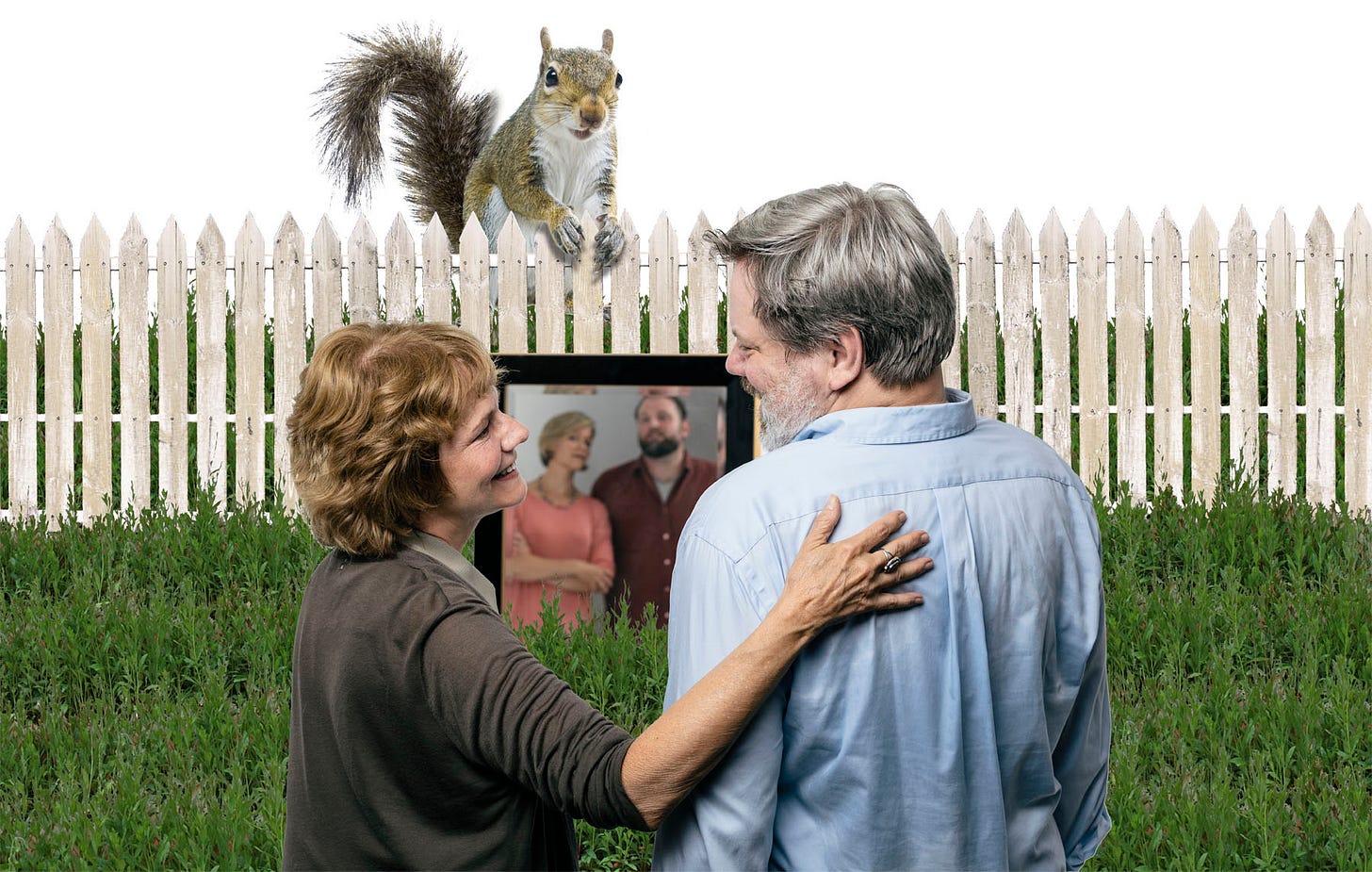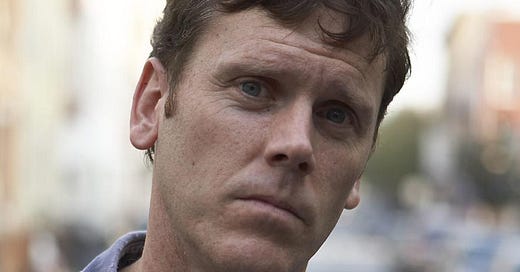Welcome to the free biweekly edition of Storefront Rebellion! This free digest brings Chicago theater news and reviews from me, Kris Vire, right to your inbox. I definitely want to hear your feedback: Reply to this email, or if you’re reading this on the web, hit me at kris@krisvire.com or find me on Twitter @krisvire.
Storefront Rebellion Interview: Will Eno, part 1
Playwright Will Eno begins our conversation in a manner not every playwright would: with a statement of support for theater criticism.

Will Eno
“I think about reviewing—the sort of landscape of criticism and thought about theater—and it just seems unfortunate and also impossible that Broadway is thriving through the roof and all that stuff and meanwhile the journalistic landscape is changing and being downsized in many ways. It just seems like a misordering of priorities, I don't know,” Eno tells me on the phone from his home in Brooklyn the morning after Christmas, with his four-year-old daughter playing in the background.
“I just think of the national discourse, just to put it as blandly and generally as that,” he continues. “What is the state of the national discourse? And one could say very easily it suffers massively from a lack of engaged critical thinking, right? It does seem the conversation is about, every step of every thing is: Who are we? What do we wanna be? And what’s an important thing in life? And what is important to celebrate or investigate? It just seems so much larger than a minor conversation about allocating funding in a newsroom.”
Eno sounds here, frankly, a lot like one of his characters. His plays, including Tragedy: a tragedy, Title and Deed, Middletown, and the Pulitzer Prize finalist Thom Pain (based on nothing), tend to place the people he depicts in seemingly ordinary situations that are also somehow existential crossroads. Eno’s characters face the unknown with spouts of verbose but precise language, capturing the rhythms of everyday speech along with frequent, unexpected turns of meaning that make you sit forward in your chair to keep up.

Brenda Barrie and Michael Patrick Thornton in Will Eno’s Middletown at Steppenwolf Theatre Company (2011). Photograph: Michael Brosilow
His play The Realistic Joneses, Eno’s first to be produced on Broadway, concerns two couples with the same last name who become neighbors and—haltingly, fitfully—discover their surname isn’t the only connection they share. This month, Shattered Globe Theatre and Theater Wit join forces to stage the Joneses’ Chicago premiere, helmed by frequent Eno director Jeremy Wechsler.
This interview has been edited and condensed.
Kris Vire: I’m frankly surprised it’s taken this long to get The Realistic Joneses to Chicago. It’s going to be almost five years since the Broadway run, right?
Will Eno: Right. It’s always nice to have things going, but Jeremy wanted to do it very early on, and so it was just a matter of sort of scheduling things—just trying to figure out when that play works. It’s been a while but I'm glad Jeremy’s doing it, and I’m psyched for these two different theaters to collaborate on it.
KV: I was glad to see that Jeremy’s attached to it. This is, I think, the fourth time that he’s directing a Chicago premiere of one of your pieces; he really seems to have the right kind of directorial sensibility to mesh with your sensibility as a writer.
WE: Agreed.
KV: That has to be gratifying to find that kind of partnership.
WE: It’s great because it’s one of those things like a lot of stuff in life: I don’t take it for granted a bit, but it just feels very easy and true. Jeremy’s got a great, a really, really good sense of humor. He’s got a really big heart. He’s a super, super intelligent guy about theater and all that stuff. I think I mean those things roughly in that order. I might even put heart first—I think he's got a big, sympathetic good heart and so I think he leads with that. He’s interested in finding simple, straightforward human stuff. And so I really appreciate that because I think it’s findable, I hope it’s findable.

Linda Reiter and H.B. Ward, foreground, and Cortney McKenna and Joseph Wiens, rear, in a promotional image for Shattered Globe Theatre/Theater Wit’s The Realistic Joneses. Photo/illustration: Nico Fernandez/A Little Photo Studio
KV: In the published edition of The Realistic Joneses you have a note about the text—something like: “the sentences may look ungrammatical but they’re consistent with the way people really speak and there shouldn’t be too much apparent effort in conveying the way that characters change direction mid-thought.” But I imagine there is a lot of effort that goes into writing in those rhythms. And in the wrong hands, of directors or actors, it could easily come across as very mannered, right?
WE: I'm sure that that’s true, yeah. I wouldn’t need to offer that now to Jeremy, just because I think he understands the drive is to create something either human, or so humanlike that you might not notice the difference. I don’t know if that note helps people, but I do mean it, if you just look at how people talk it would be filled with double em-dashes I suppose. All of our speech would be filled with asterisks and double em-dashes and diereses, if that’s the right plural of the right word.
Shattered Globe, which I don’t know a ton about, it seems like their stock-in-trade is kind of on the ground, in the realistic and naturalistic realm. So I’m excited about that aspect of this too. Because I think when this play has landed the most with people, it’s landed as a thing about marriage, as a thing about dealing with loss of intimacy in a relationship. Or how to incorporate the unincorporateable notion of mortality into our daily life in a way that doesn’t overwhelm us but that keeps us on our toes about what life is. So I think it’s a good combination of cast and director and theaters to give that kind of simple and spare version of it rather than an ornate something-or-other.
“For whatever reason, I just might have in my blood some tilt or drift toward existential things.”
KV: I was looking back over some of my past reviews of your shows here in Chicago and I came across this phrase that I used to try and describe what I guess I see as a central concern of a lot of your work: “uncertain but unavoidable endeavors.” And that—
WE: Oh, nice. Yeah.
KV: Having read The Realistic Joneses now, I think that that certainly applies here.
WE: That's really nice, “uncertain but…” I’m sure there’s a meaningful etymology that makes that even more poignant and correct. But that’s great.
KV: In this play as in several others, it feels like you’re kind of tackling these big existential questions about life and death, but you’re approaching them as they play out in smaller, in the most banal human interactions, right?
WE: I suppose—I think that’s really true. And the only reason I’m hesitating is that, to be plain and to be, I hope, just humble, it might be a sort of inverse of that. Which is that I’m tackling questions of intimacy and the small human things in the only way I know, which probably just has a small scale to it because of some aspects of timidity and worry and just a kind of minorness that I might feel in myself. And that I also, for whatever reason, just might have a little bit in my blood, some tilt or drift toward existential things.
I know I’ve said this before, and I’ll just try again because I probably didn’t get it exactly right the first time. I think you can—there’s ways people can approach something in a sort of capital-E Existentialist way, and leaning on French texts and other you know “serious” philosophical arguments. And then I think there’s also a thing that’s just, a lot of that stuff can line up with the way a kid might wonder, “Do people see me when I’m not there?” You know, just a simple human thing of being seen and existing in that way and not in any kind of fancy French way but just, “Do people see me? It seems like you don’t see me and I’m trying to say who I am.”
My daughter, we went to church kind of dutifully around Christmas Eve—it’s not something we regularly do, but it’s just another idea of community that we want to introduce. We’re just trying different places. But my daughter said, “Hey, there’s pictures of baby Jesus and grown-up Jesus but there’s no kiddo Jesus? Kiddo Jesus like me?” I’ve got to do some work, I think, in preparing for the conversations we’ll have at some point about religion and stuff like that. But essentially she was saying in a not very metaphorical way, “I do not see myself represented here in this story of this person. I do not see the physical representation of myself at the way I am now.”
Which, you know, I suppose that has some bearing in some way on existentialism in the grandest sense, but that was also just a kid having an observation about themselves in the world. I guess I’m saying I’m not setting out with a grand philosophical question; it’s a little bit more something simple, like I’m noticing in my own life that I feel sort of ashamed of mortality, and ashamed of getting sick, and hurting your back, or anything like that. It does make you feel—or it makes me feel—not good about myself in a way that then seems to have an effect on how I might deal with my life and our marriage or other people I’m close to. And so that was one of the big questions of the Joneses was, how do people respond to these big things with respect to their partners in life?
The Realistic Joneses begins preview performances this Thursday, January 10, at Theater Wit. Paid subscribers to Storefront Rebellion will get more excerpts from my conversation with Will Eno in coming days. Want to support this kind of independent, ad-free coverage of theater in Chicago, and get exclusive show reviews and features? Subscribe or upgrade by January 15 and get half off your first month:
Upcoming openings
With the holidays behind us, January is coming in hot with new show openings over the next two weeks, along with a slew of winter festivals. Some highlights, in addition to The Realistic Joneses:
I Call My Brothers Interrobang Theatre Project at Rivendell Theatre, opens tonight
St. Nicholas Goodman Theatre, previews January 9, opens January 13
Noises Off Windy City Playhouse, previews January 9, opens January 16
Cardboard Piano TimeLine Theatre Company, previews January 9, opens January 17
Dada Woof Papa Hot About Face Theatre at Theater Wit, previews January 10, opens January 17
Small Jokes About Monsters 16th Street Theater, previews January 10, opens January 17
Evil Dead: The Musical Black Button Eyes Productions at Pride Arts Center, previews January 11, opens January 18
PLUS
The 18th Annual Chicago Sketch Comedy Festival, January 10–20
Chicago International Puppet Theater Festival 2019, January 17–27
Fillet of Solo 2019, January 18–February 2
The 30th Annual Rhinoceros Theatre Festival, January 18–February 24
Thanks for reading! This is the free biweekly edition of Storefront Rebellion, a newsletter about Chicago theater by Kris Vire. You can subscribe for $6 a month or $60 a year to receive exclusive show reviews and more in your inbox.
Send tips and feedback to kris@krisvire.com, and if you know someone you think would enjoy this newsletter, feel free to forward this to a friend.



